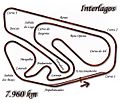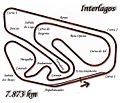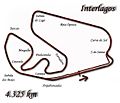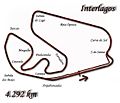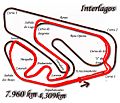Autódromo José Carlos Pace facts for kids
| Interlagos | |
|---|---|
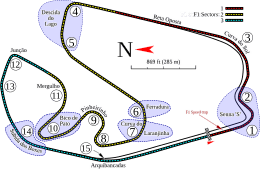 |
|
| Location | São Paulo, Brazil |
| Time zone | GMT -3 |
| Major events | FIA Formula One Brazilian Grand Prix Mil Milhas Brasil, Stock Car Brasil, Fórmula Truck, TC 2000 |
| Current Circuit (1990-present) | |
| Length | 4.309 km (2.676 mi) |
| Turns | 15 |
| Race lap record | 1:11.473 ( |
| Original Circuit (1936-1989) | |
| Length | 7.960 km (4.975 mi) |
| Turns | 26 |
| Race lap record | 2:21.40 ( |
The Autódromo José Carlos Pace, often called Interlagos, is a famous race track in São Paulo, Brazil. It's named after José Carlos Pace, a Brazilian Formula One driver who passed away in 1977. This track is super well-known because it hosts the exciting Formula One Brazilian Grand Prix every year.
Contents
History of the Interlagos Race Track
The land for the circuit was bought in 1926 by people who wanted to build a new neighborhood. But after money problems, especially because of the Wall Street Crash of 1929, they decided to build a race track instead. Construction began in 1938, and the track opened in May 1940.
The name "Interlagos" means "between lakes" in Portuguese. This is because the track was built between two big artificial lakes, Guarapiranga and Billings. These lakes were made in the early 1900s to provide water and electricity for the city. In 1985, the track was renamed to honor José Carlos Pace. He was a beloved Brazilian Formula One driver who died in a plane crash.
The race complex also has a kart track. It is named after another famous Brazilian driver, Ayrton Senna.
What Makes Interlagos Special?
Interlagos is one of the few race tracks that goes in an anti-clockwise (counter-clockwise) direction. Most tracks go clockwise. The current design of the track was made in 1990. The original track was much longer, about 7.8 kilometers. It was shortened to 4.3 kilometers to meet new safety rules. The older track had many fast turns, which were considered very dangerous.
Even with the changes, the new track still has a very long, high-speed section. This part has bumps and fast turns, making it tricky for drivers.
The Hilly Track
Another cool thing about Interlagos is that it follows the natural ups and downs of the hilly ground. This makes the circuit harder to drive and puts more stress on the car's engine. The hilly course is also great for cycling races held here.
Bumpy Surface
The track is known for its bumpy surface. This can be tough on Formula One cars, which are built very low to the ground. The races are also physically hard on the drivers. Because there are more right turns, drivers' necks are pushed to the left. Since drivers usually turn left more often, the other side of their neck is often stronger.
Improvements in 2007
Before the 2007 Brazilian Grand Prix, the circuit got a huge makeover. These were the biggest repairs in 35 years! The main goal was to fix the bumpy track surface. The old asphalt was completely replaced, making the track much smoother.
At the same time, the entrance to the pit lane was made safer. A new grandstand (seating area) was also built for fans. To do all this work, the circuit was closed for five months before the race.
Also in 2007, a new train station called Autódromo opened near the circuit. This made it much easier for people to get to the track from the center of São Paulo.
Exploring the Track Course
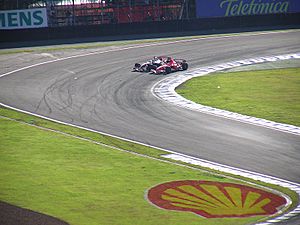
The race starts in front of the "Tribunas" section, which has a long straight part. After that comes "S do Senna" (Senna's S), a series of quick left, right, and left turns.
"S do Senna" leads into "Curva do Sol" (Sun Turn). This is a wide left turn that takes you to "Reta Oposta" (Opposite Straight). This straight section is named after an old, unused part of the track. Next are two downhill left turns called "Descida do Lago" (Lake Descent) and "Mergulho" (Dive). Then there's a short downhill straight.
After "Mergulho", there's a slow and tricky part of the track. It has tight turns and changes in height. These turns are "Ferradura" (Horseshoe), "Laranjinha" (Orange Turn), "Pinheirinho" (Small Pine Tree), and "Bico de Pato" (Duck Bill). Finally, there are two left turns called "Junção" (Junction).
After "Junção", there's a long, high-speed section. This is "Subida dos Boxes" (Up to the Pits), a long, uphill left turn. At the very end are turns 14 and 15, which used to be called "Cotovelo" (Elbow).
Pit Lanes at Interlagos
Interlagos has one of the longest pit lanes ever used in Formula One. It starts just before the main start-finish straight. Cars rejoin the track after the "Curva do Sol" turn. Before 2007, the pit entrance was a fast, tricky left turn. It was changed to be much safer for the 2007 Brazilian Grand Prix.
Fastest Laps at Interlagos
Here are some of the fastest laps recorded at the Autódromo José Carlos Pace:
| Category | Time | Driver | Team | Date |
|---|---|---|---|---|
| Formula One | 1:11.473 | Juan Pablo Montoya | Williams-BMW | 2004 Brazilian Grand Prix |
| Le Mans Series-LMP1 | 1:18.787 | Pedro Lamy/Stéphane Sarrazin | Peugeot 908 HDi | 2007 Mil Milhas Brasil |
| Formula Three | 1:30.170 | André Sousa | Full Time | 2005/12/ 9 |
| Formula Renault | 1:37.109 | Diego Freitas | UniOil Sports | 2003/12/ 6 |
| Stock Car Brasil V8 | 1:39.585 | Raul Boesel | Bassani Racing | 2004/ 4/17 |
| Maserati Trophy | 1:47.655 | Guto Negrão | Medley | 2006/ 3/25 |
| Formula Truck | 2:04.616 | Wellinton Cirinno | ABF/Mercedes-Benz | 2003/10/ 5 |
Images for kids
-
A bust (sculpture) of José Carlos Pace at the circuit.
See also
 In Spanish: Autódromo José Carlos Pace para niños
In Spanish: Autódromo José Carlos Pace para niños
 | Delilah Pierce |
 | Gordon Parks |
 | Augusta Savage |
 | Charles Ethan Porter |


